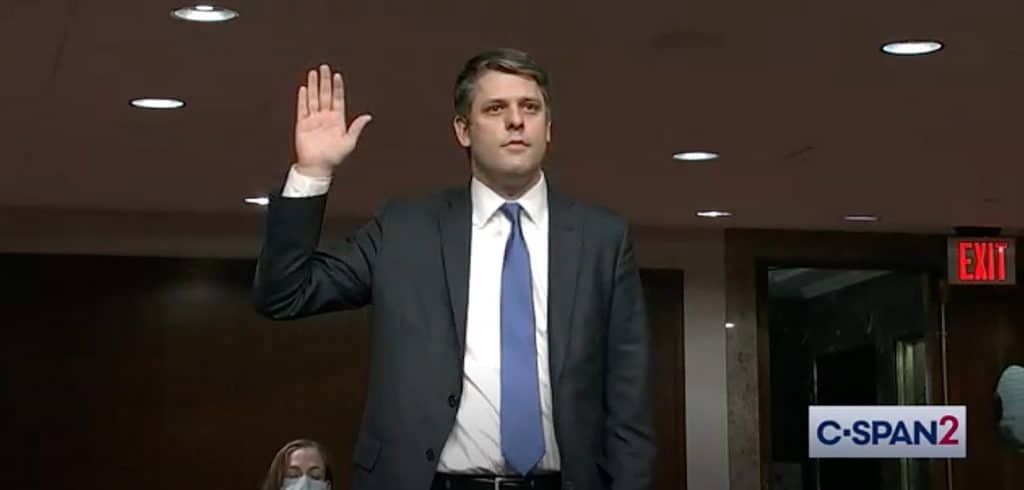US courts accept climate science. Can Trump and McConnell undo that?
By Dawn Stover | June 3, 2020
 Justin Walker at his May 6 Senate confirmation hearing.
Justin Walker at his May 6 Senate confirmation hearing.
At a meeting tomorrow, the US Senate Judiciary Committee is expected to confirm President Trump’s nomination of 37-year-old Justin Walker to become a judge on the US Court of Appeals for the District of Columbia Circuit, the second-most-powerful court in the land and often a stepping-stone to the Supreme Court.
The DC appeals court has made some key rulings on climate cases, and Walker will hold a lifetime appointment to it. Does he believe human activity is contributing to or causing climate change? Democratic Senator Dianne Feinstein asked him that question during the confirmation process for his first federal judgeship last year, but Walker responded with a non-answer: “These issues are implicated by pending or impending litigation. The Canons of the Code of Conduct for United States judges therefore prohibit me from expressing a view.”
A few weeks ago, Feinstein tried again: “Other judicial nominees during this administration have been willing to respond directly to this question [about climate change]. Did those nominees violate the judicial canons?” Walker again dodged the question, saying that nominees “must interpret the judicial canons for themselves.”
While Walker’s views about climate change remain cloaked, a survey of recent court cases suggests there is now widespread judicial agreement that humans are indeed warming the climate. The question is whether that agreement will persist in the face of efforts by President Trump and Republican Senators to appoint a record number of conservative judges like Walker.
Vast judicial agreement. In a report published in late April by the Environmental Law Institute, international lawyer Maria L. Banda “examined judicial pronouncements in different climate-related proceedings since 2015, including in civil, administrative, constitutional, and criminal law matters, in the United States and in a dozen foreign jurisdictions.” Banda found vast agreement on “the causes, extent, urgency, and consequences of climate change” across a broad range of courts and countries. “This is a major shift since the early climate lawsuits when climate skepticism was still commonplace among judges and litigants,” she reported.
#Climatechange has been the subject of a great deal of controversy & disinformation in the US. Wouldn’t it be great if we had a way to separate fact from fiction? New ELI report reveals that we already have a tool to find the truth: the judicial system https://t.co/7ERsewuwr7 pic.twitter.com/zYZxwnCErn
— Environmental Law Institute (@ELIORG) April 22, 2020
Banda found that disputes in the past five years have focused on the legal implications of climate science, rather than on whether the science itself is sound. Even though there appears to be a judicial consensus on climate science, however, that has not translated into judicial intervention to require climate action by governments or businesses.
The general public is even less aware of the judicial consensus on climate than of the scientific consensus. However, Banda suggests that judicial findings “offer currently untapped potential for enhancing public understanding of climate science and for breaking through political obstacles to climate solutions.”
A new wave of judges. New political obstacles may be coming, though, with a concerted effort by President Trump and Republican Senators to install a record number of new judges. Trump has appointed more judges than any other president except Jimmy Carter, and his nominees now control more than a third of the seats on the Ninth Circuit, which covers the entire West Coast and has decided many environmental cases. Many of Trump’s nominees have been chosen by the conservative Federalist Society, which has allowed members to publish articles promoting the notion that there is no scientific consensus on climate change.
In an interview last week, Senator Lindsey Graham, who chairs the Senate Judiciary Committee, urged judges who are over 60 to retire so that their positions can be filled by conservative younger judges while the Republican Party holds control over Senate confirmations. Senate Majority Leader Mitch McConnell, who has worked tirelessly during the Trump era to pack the courts with conservative judges, has also encouraged appeals court judges nominated by Republican presidents to retire.
Walker, a protégé of McConnell, is one of those young judges who have been fast-tracked. Walker was still in law school during the Obama administration. Less than a year ago, he was appointed to the US District Court for the Western District of Kentucky on a party-line vote, despite having no significant trial experience. If he ascends to the DC Circuit Court as expected, he will fill the seat vacated by Brett Kavanaugh, for whom Walker worked as a law clerk.
Kavanaugh is no champion of the environment, but in 2016 he told a federal courtroom: “The earth is warming. Humans are contributing.” That’s further than his former clerk has been willing to go.
Together, we make the world safer.
The Bulletin elevates expert voices above the noise. But as an independent nonprofit organization, our operations depend on the support of readers like you. Help us continue to deliver quality journalism that holds leaders accountable. Your support of our work at any level is important. In return, we promise our coverage will be understandable, influential, vigilant, solution-oriented, and fair-minded. Together we can make a difference.
Keywords: judicial consensus
Topics: Climate Change















perhaps the questions should have been asked in a stepwise manner:
Do you believe the science of gravity ?
The science of germ Theory ?
the conclusions from the latest National Academy of Sciences report on climate?
The recent scientific consensus reports from The Intergovernmental Panel on Climate Change (IPCC) ?